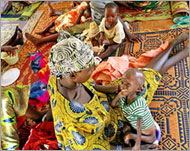African nations in fresh health scares
An unidentified respiratory disease has killed eight more people in an eastern Congo diamond-mining region, pushing the death toll to 29 as the number of infections topped 1000, health officials say.

The apparent viral pulmonary illness that causes victims to vomit blood began spreading in Maniema Province in mid-July officials said on Monday and that by 8 August 21 people had already died.
Eustache Bibala, a government doctor in the area, said eight more had since died and that medical staff had documented 120 new infections, bringing to 1117 the number of affected.
The illness appears to have originated in a diamond mine and been spread by workers into nearby communities, said Jean-Baptiste Shuli Tchomba, another high-ranking health official in the region.
The mine near Punia, 280km (170 miles) west of the border town of Goma, has about 10,000 people employees, aid workers said earlier.
Angola polio outbreak
Meanwhile, an outbreak of polio in Angola could cross into neighbouring Congo and Zambia, which until now had been free of the disease, the UN health agency said.
|
“If [polio] got reintroduced in Congo, their immunity levels are low and it would be very grave” Oliver Rosenbauer, |
The latest two cases in Angola -where the total has now reached six – were diagnosed close to the country’s borders, prompting fears that the virus could jump to its polio-free neighbours, said, polio spokesman for the World Health Organisation Oliver Rosenbauer.
“If it got reintroduced in Congo, their population immunity levels are low and it would be very grave indeed,” Rosenbauer told reporters.
“In Zambia, there is a threat as well.”
Last month, two cases of polio were diagnosed in Angola, the country’s first new cases of the crippling disease in four years.
Emergency immunisation
The Angolan authorities undertook an emergency immunisation at the end of July to vaccinate an estimated five million children. A second round is planned for later this month.
All six cases have been tied to a strain of the virus found in India and investigations are still trying to determine how it made its way to southwest Africa and subsequently to different cities in Angola.
Polio is spread when people who are not vaccinated come into contact with the faeces of those with the virus, often through water.
It usually attacks the nervous system, causing paralysis, muscular atrophy, deformation and sometimes death, though only about one in 200 of those infected develops symptoms.
Ethiopian malaria epidemic
In a sepaerate development, Ethiopia has voiced concern over a major malaria epidemic outbreak, with the number of infections in some regions already well above normal and the rainy season not yet ended.
“We are alerting everybody and preparing ourselves as much as possible for this big epidemic,” Health Minister Kebede Tadesse said.
The government and the United Nations say the epidemic could break out when the rainy season ends next month. Pools created by rainfall are ideal sites for mosquitoes, which spread the disease, to breed.
Some 50 million of Ethiopia’s 71 million people are at risk from the disease, which is treatable but deadly in poor countries like Ethiopia.
Recent scourge
During the last major epidemic in 2003, six million more people than usual were infected and 40,000 more than usual died.
 |
|
In countries such as Niger, |
“Reports from several regions this year indicate that there is four to 10 times the number of malaria cases compared to similar periods during the past two years,” said Bjorn Ljungqvist, head of the UN Children’s Fund in Ethiopia.
More than two million insecticide-treated nets and some 600,000 kits to rapidly diagnose the disease were being distributed around the country, health officials said. The new nets would triple the number of people using the life-saving fabrics this year.
Most of its $100 million funding is provided by the US-based Global Fund for HIV/Aids, Malaria and Tuberculosis.
Emergency drugs for 2.5 million people have also been imported to combat the epidemic. Around 80,000 children die from malaria – about 220 children a day – in Ethiopia, with as many as 10 million people falling sick a year, according to Unicef.